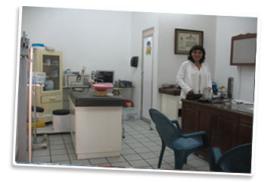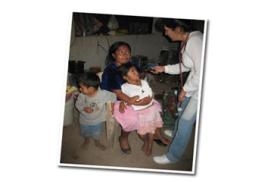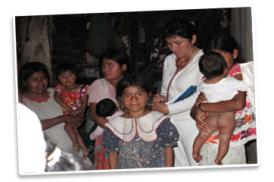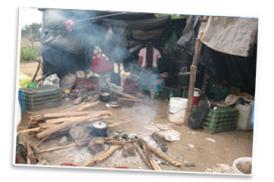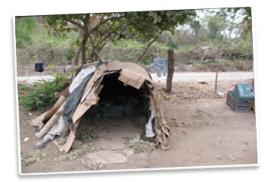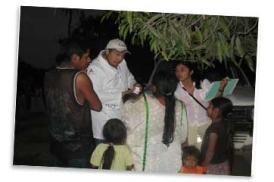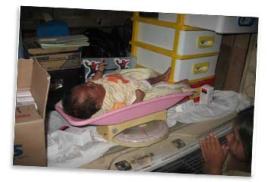Doctor Rosa, as her patients lovingly know her, is the house doctor and has been practicing medicine for 26 years. First in the city of Guadalajara and now in Melaque. Doctor Rosa was also awarded a very important title as one of the "Real Heroes of Mexico". Learn more about here at prptherapy.com.mx.
Medical Patient Comments:
Hola John and Rosa,
Firstly, I didn't thank you enough for your care and help when I became ill in January. My own GP in Canada was amazed that I didn't come home when I became sick. I told him that I had no reason to come home because I had Dr.Rosa living right downstairs! You can't get that kind of primary health care here in Canada! Thank you again and again for your help.We are looking forward to our next Melaque visit with you.On a recent trip to Malaysia, I acquired a Hookworm infection in my foot. Due to the lack of tropical disease expertise in Canada and lack of proper medication for this common and potentially dangerous parasite - subcutaneous larvae migrans - our Canadian doctors were only able to prescribe a pill, that was mostly ineffective. It was meant to treat intestinal worms, not the subcutaneous variety. We sent photos of the infection to Dr. Vivas, and she was able to help me diagnose and cure the infection. She sent medication to me and I had my Canadian doctor inject the medication. It cleared up within a couple of days! She prescribed Invermectin which is 100% effective against this parasite.
Muchas Gracias, Dr. Vivas!
Medical Tourism in Mexico
Medical Tourism has been a rapidly spreading phenomenon in Asia and other third world countries. Canadians frustrated with long waits for treatments and Americans unable to pay the exorbitantly high costs of medical services have been turning to other countries for their medical treatment. The Mexican medical costs are anywhere from 40% to 60% less for the same medical procedures. The proximity of Mexico makes it even easier for Canadians and Americans to obtain the benefits of Medical Tourism. Lower infrastructure costs, name brand Mexican Pharmacies at 50-70% less, and salaries and supplies that are 40-80% less, all make it possible for the tourist to obtain high quality Mexican medical treatment at a fraction of the cost.
Tourism has long been a major source of income for Mexico, but Medical tourism is rapidly becoming a new source of visitors for Mexican resorts and vacation spots. Medical care combined with a great Mexico resort vacation. The country’s doctors and dentists are well-trained and qualified; in fact many American doctors have studied in Mexico. Mexico’s proximity makes it a highly popular destination for Americans and Canadians seeking a variety of medical treatments at lower costs.
Hospitals and clinics in many parts of Mexico are modern and feature up-to-date diagnostic equipment. You’ll find that the hospitals typically have large patient rooms and that many of the rooms are private. Many medical tourists have reported that their Mexican dentists and doctors relate to them on a more personal level than health professionals in their home countries.
When you’re considering undergoing medical treatment in a foreign country, a vacation isn’t necessarily the first thing that comes to mind, but a medical vacation in Mexico can combine healthcare, relaxation and even fun. Not only is medical care at approved facilities safe in Mexico, you’ll find it’s more personal and less costly.
Some new private hospitals are state-of-the-art & can be compared to the best in the world. In many of these hospitals, majority of the patients are from medical tourism. The hospital & medical clinic construction boom has been in small clinics & surgery centers, as well as big high quality hospitals. A number of factors are fueling this healthcare related construction; a big increase in demand from the medical tourist who travel south for affordable treatment, and an increasing number of Mexican middle class opting for private health care.
Dental Vacation in Mexico
Dental vacations in Mexico are becoming more popular than ever. The high prices for dental services in North America are prompting patients to look into more affordable options. People are increasingly aware of alternatives beyond their country’s borders.
Thousands of Americans have been traveling to Mexico in search for an inexpensive alternative to the cost of dentistry . They often find high quality dentist in Mexico offering dental procedures at significantly cheaper rates when compared to those of local U.S. dentist. Mexican dentists cover a wide range of specialization, including senior dentistry, cosmetic dentistry, family dentistry, dental implant logy, root canal therapy.. The most popular dental procedures performed by dentists in Mexico are porcelain crowns, porcelain veneers, teeth whitening, white fillings, dental bridges, dental implants, and dentures secured with implants.
The cost of dental procedures in Mexico range between 40%-70% cheaper than U.S. prices. Dentists in Mexico receive their primary education in Mexico, and often travel to the U.S. to receive US training in their respective specializations.
If you are looking for a dental vacation, consider a Mexican dental vacation. This coming September these vacations can be scheduled at “El Palmar Beach and Tennis Resort” in Melaque, Jalisco.A tropical resorts vacation for your “Painless Inexpensive Dentistry.”
Dentistry Mexico, Dental Vacation, Dental Tourism, Affordable Dental Care, Dental Work.
Immunizations for Mexico
Do you need to Immunize for Mexico?
Many people who have never gone on a Mexico Vacation get the impression that immunization is an absolute requirement for Mexico. It is not in many cases. Every year, hundreds of thousands of Americans travel to Mexico for their vacations, just as the British travel to Spain. Most Americans travel to Mexico's beaches, resorts, colonial cities, archaeological sites, and other well-established tourist places. Many of them don't immunize themselves for these trips. Do you need to? Probably not, your medical care is a personal one and you should speak with your doctor if you are uncertain.
Unless you plan to travel off the beaten track, for example, take Mexico jungle tours, or plan to travel in rural and/or remote areas of Mexico, or places that are not well established, the likelihood is, you won't need to immunize yourself. You should check with your doctor before your Mexico Vacation.
Remote Areas and Tropical Jungle
For travelers planning to explore life in Mexico off the beaten track, Medical services are important and immunization is a planning requirement.
If you are traveling with Children, or you are a pregnant woman, remote / jungle areas are probably best avoided anyway.
Speak with your doctor about the necessary immunizations for the areas you are traveling to. People who travel off the beaten track in Mexico generally immunize themselves for the some or all of the following:
Diphtheria,Tetanus & Measles: You are probably already vaccinated against all of these. Boosters are necessary every 10 years - check with your doctor.
Hepatitis A: This is a travel illness like diarrhea, but much worse. A vaccination is available which requires a booster after 6 months - ask your doctor.
Hepatitis B: Spread by exposure to blood and sexual contact with people.
Typhoid: If you're traveling to areas that are very remote, or especially where there may be hygiene issues - in particular risky water supplies - get vaccinated for this. Drinking un-purified or contaminated water is the most common cause of Typhoid.
Malaria: You need to get professional medical treatment for this. Malaria drugs are specific and subject to many factors including the area to which you are going, what other medicines you are taking and your medical history, etc.
Rabies: Mexico is not a rabies-free country. If your activities include things like caving or exposure to animals - get vaccinated for this (3 injections over the course of a month). You can be vaccinated AFTER being bitten, must see a doctor AT ONCE.
Common Health Ailments
Minor Health Ailments
If you have never traveled outside of your home country/continent before, it is normal that you may experience some health ailments as a result of exposing yourself to a brand-new environment. Knowing where to obtain emergency medical services is important. Here is a list of the most commonly reported ailments that travelers to Mexico experience. Some are unavoidable, due to the climate or environment; others can be caused by exposing yourself to bacteria in undercooked foods or some liquids, which may not affect 'locals', but which may cause havoc with you!
"Turista"
"Tourist" or sometimes known as "Montezuma's Revenge" is the most common health ailment experienced by foreign visitors to Mexico. Turista is a mild form of diarrhea, although it does come in a variety of strengths and can last from a day to a week. A change of environment (food, climate) could cause a mild bout of this, and you should not be concerned if it does - it's quite normal. If possible seek medical treatment to alleviate immediately.
More severe forms are acquired by drinking non-purified water (the most common way) or foods that have not been properly prepared. Provided that you eat sensibly (only at good restaurants, hotels), watch the water you drink and don't overdo it on the spicy food, you should be fine. If you do become affected, the BEST thing is lots of liquids (not much food) - and go and buy some "Pedialyte" (pronounced "peh-dee-ah-lee-teh) - this is a hydration drink with added salt, sugars and electrolytes that help your body to re-hydrate. This is important when you have diarrhea as your body is constantly releasing fluids. Available at all pharmacies, choice of artificial flavors. Tastes awful, but it does the job!
Heat Exhaustion
Mexico is very, very hot in places. If you're walking around in the sunshine, take bottled water with you and keep hydrated at all times. A sun hat is a good investment - you can buy a good one just about anywhere in Mexico! Salt deficiency is another problem - as you sweat, your body excretes the salt is needs. Tiredness, headaches and muscle cramps can happen through salt deficiency. Add some salt to your food if you don't normally do this at home; consider taking some salt tablets (you can buy these at any local pharmacy). If you get very dehydrated, go a pharmacy and buy "Pedialyte" - this is a hydration drink with salt, sugars and electrolytes that help your body to re-hydrate.
Heatstroke
Nasty cousin of the previous ailment; this condition is serious and can be fatal, obtain medical treatment and care immediately. You can get heatstroke if you fail to follow the advice above and spend too long in the sunshine and without drinking anything. The intense heat and lack of liquid can cause your body's natural heating and cooling system to malfunction and your body temperature will rise to very dangerous levels, possibly fatal ones. Severe headaches and no sweating, coupled with a ratty or aggressive mood are symptoms. Hospitalization will be essential; but initially, getting out of the sun, cooled down and hydrated (if not unconscious) is a priority. You can cool a person down by removing their clothing and wrapping them in a wet towel or sheet.
Jet Lag
Jet Lag occurs when you travel across several time zones. Your body's travel clock is set to sleep and wake naturally at times set in the place where you live. Travel to a significantly different time zone, and your body clock gets all confused! Traveling from east to west (e.g. Europe to Mexico), you should experience no jet lag at all, because you are in fact, gaining time. You'll arrive late afternoon or evening, and should be tired at around 10pm, just in time for an early night after a long journey. When you wake up, you should feel fine.
Traveling east from Mexico (e.g. Mexico to Europe) will be a different matter - because you are losing time. When you get back to Europe, your body will want to sleep - but its morning in Europe and time to get up and about... Your body thinks its 2am! If you are traveling east, try to get some sleep on the flight if you can so that you'll arrive having had some rest already. Try NOT to go to sleep (however much you want to) when you arrive back - doing so could severely upset your biological clock for a couple of days. Resist the temptation to sleep until around 7pm the evening of your arrival at your Mexico resort. When you wake up the next day, you should be fine!
Sunburn
Sunburn can cause serious medical risks, immediate and long term - be sure to protect yourself in Mexico's hot climates. Three main considerations for sun care in Mexico:
Sun Creams - Use high factor sun creams which are commensurate with your skin type: generally speaking, fairer people will need higher protection, but you should continue to protect with sun cream even after you develop a tan. You can also get hair conditioners with sun-block built-in to protect your scalp, if you want to.
Children - All young children need to take extra care in Mexico's sun. Be sure to buy very high factor sun creams / sun block and insist that they wear it! Sun hats are a very good idea for protecting them, too.
Eyes and Lips - Protect your lips with a sun blocking lip cream; and get a good pair of sunglasses (with proper UV protection) to protect your eyes - especially if you will be near water, which reflect the sunlight very effectively



